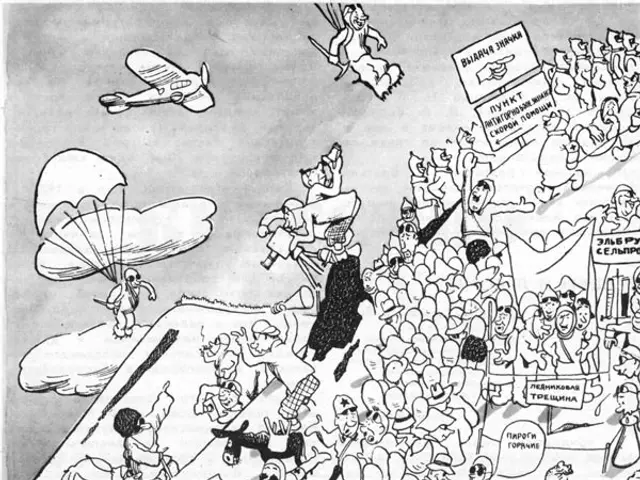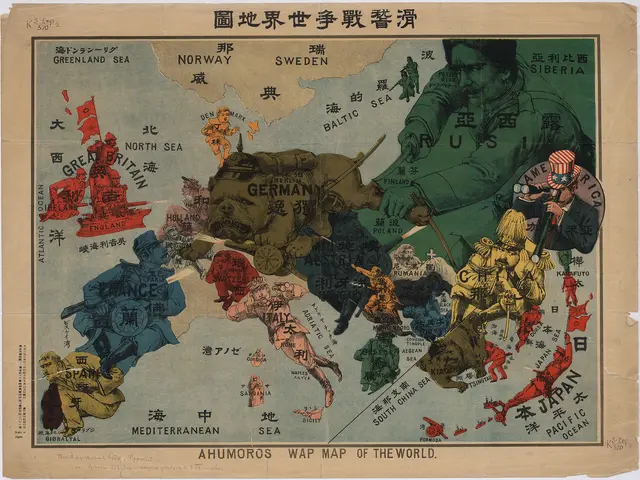Compelling Urge to Always Be the Final Speaker in Discussion
Squabbles Between Allies: PQ and Bloc Québécois
The political scene in Quebec is lively, with the Parti Québécois (PQ) and the Bloc Québécois being in the spotlight. Although both parties advocate for Quebec's interests, they operate on different levels and have distinct histories and ideologies.
Historical Background
- PQ: Founded in 1968, the PQ is a provincial party focusing on Quebec independence. It has frequently led the Quebec government and held referendums on sovereignty, in 1980 and 1995[1].
- Bloc: Formed in 1991, the Bloc is a federal party mainly fighting for Quebec sovereignty in Ottawa. It was created by Quebec Members of Parliament who left the Conservative and Liberal parties after the Meech Lake Accord's failure[1].
Historical Differences
- Operation Level: The PQ operates at the provincial level, while the Bloc works federally, leading to differing strategic priorities.
- Electoral Focus: The PQ centers its election platforms around independence via provincial governance, while the Bloc emphasizes protecting Quebec interests in Ottawa.
Evolution of Ideological Stances
- PQ: Over the years, the PQ has maintained a strong stance on Quebec sovereignty, shaping provincial politics through a focus on independence.
- Bloc: While dedicated to sovereignty, the Bloc has demonstrated flexibility in collaborating with other parties. This pragmatic approach can sometimes trigger criticism from the PQ for deviating from traditional sovereignty goals.
Current Criticism and its Impact on Quebec Politics
Recent Criticisms
- Bloc's Strategy: PQ Leader Paul St-Pierre Plamondon has criticized Bloc Québécois Leader Yves-François Blanchet's strategy, specifically his willingness to work with Mark Carney, viewing it as undermining independence efforts[4].
- PQ's View: PQ leaders have expressed dissatisfaction with the Bloc's approach, regarding it as a straying from sovereigntist principles. They criticize the Bloc for not prioritizing independence during critical periods like election campaigns or trade negotiations[4].
Implications for Quebec Politics
- Sovereignty Debate: The differing approaches between the PQ and Bloc influence the public's perception of sovereignty. The PQ's firm stance keeps the issue in the public consciousness, while the Bloc's pragmatism suits those seeking immediate solutions[2].
- Electoral Landscape: Both parties impact the political landscape by shaping voter attitudes towards federalism versus independence[3].
- Party Relations: The tensions between the PQ and Bloc can affect broader support for sovereigntist causes. Criticisms and differing strategies might split the sovereigntist vote and affect other parties' success in Quebec[3].
In essence, the historical disparities between the PQ and the Bloc mainly concern their operating levels and strategic focus. Current criticisms revolve around differing ideas on how to achieve or push forward sovereignty, reflecting broader ideological disputes within Quebec politics.
[1] Carignan, J., Paquette, A., & Blais, S. (2010). Quebec Politics in the Post-Soevereignist Era: Electoral Dynamics and State-Building. UBC Press.
[2] Ouellet, M., Duval, C. (2014). The OQLF and Quebec's Identity Debate: Lessons for the Planning and Implementation of Policy on Language in Multicultural Canada. McGill-Queen's Press - MQUP.
[3] Hewitt, G. (2002). Canadian politics: a reader in Canadian government. McGill-Queen's Press - MQUP.
[4] La Presse. (2021, September 29). Paul St-Pierre Plamondon exprime son mécontentement a l'égard de la stratégie du Bloc Québécois. Retrieved from https://www.lapresse.ca/info-quebec/politique/2021-09-29/paul-st-pierre-plamondon-exprime-son-mecidentement-a-legaard-de-la-strategie-du-bloc-quebeaucis/17126282?ref=l2utm_source=La+Presse&utm_medium=CP&utm_campaign=autonome&utm_term=Politique&utm_content=2021-09-29T17:16:39
- Yves-François Blanchet, the leader of the Bloc Québécois, faced criticism from Paul St-Pierre Plamondon, the leader of the Parti Québécois, for working with Mark Carney, due to perceived undermining of independence efforts.
- The Bloc Québécois, while dedicated to sovereignty, has faced criticism for its pragmatic approach, which some, like the PQ, see as deviating from traditional sovereignty goals.
- The historical differences between the Parti Québécois and the Bloc Québécois revolve around their operating levels and strategic focus, with the PQ focusing on provincial governance for independence and the Bloc fighting for Quebec interests in Ottawa.
- Debates over sovereignty policies between the Parti Québécois and the Bloc Québécois can have implications for the political landscape, potentially influencing voter attitudes towards federalism versus independence and affecting broader support for sovereigntist causes.
- The weakness in the relationship between the Parti Québécois and the Bloc Québécois, due to differing strategies and ideological disagreements, could potentially resurface in the context of war-and-conflicts, policy-and-legislation, crime-and-justice, or general news topics.








